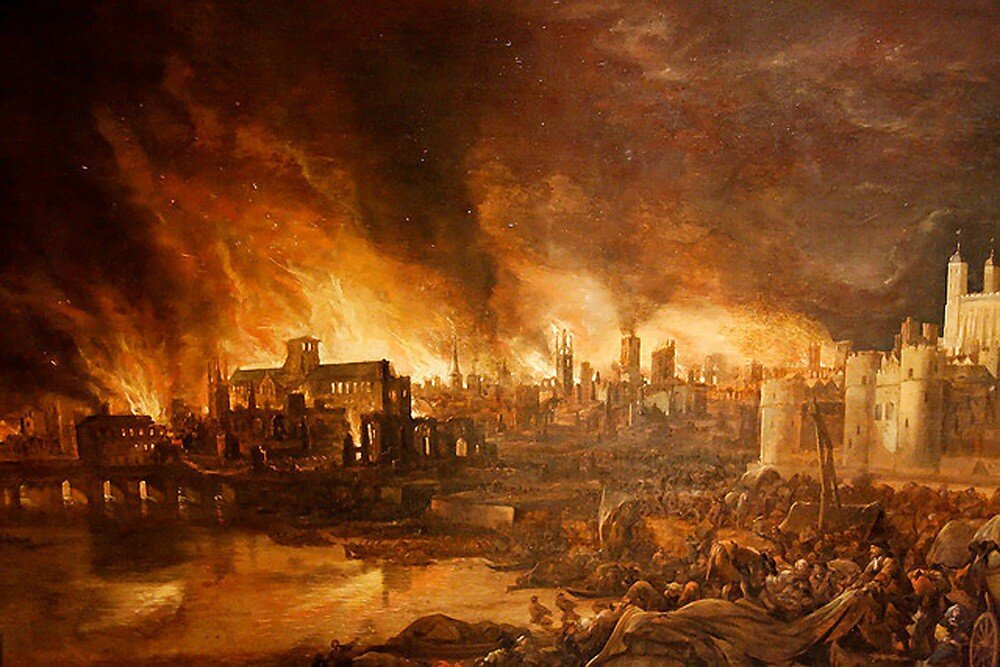Witnessing
The Great Fire of London burned for 4 days from Sunday 2nd of September 1666 until Thursday 6th by which point the medieval city had been destroyed though its embers still smouldered. Rain on Sunday 9th finally extinguished the last of the fires and traumatised Londoners were able to assess the damage. It was only a year since an outbreak of plague had killed something in the region of 80,000 citizens and those who suffered then had no way of knowing that this would be the last major epidemic of the bubonic plague pandemic that had lasted four centuries.
In lockdown, I have been reading Claire Tomalin’s biography of Samuel Pepys because his decade-long diary includes not only dinners of lobster and illicit fumblings with servant girls but also the experiences of living through plague and fire. It is very hard to feel as if one is bearing witness to anything important during Covid-19 lockdown at home. Mercifully, our family dramas in recent weeks have involved nothing more dramatic than being unable to get hold of flour for baking and a very nasty moment when I knelt in a pile of holly leaves while weeding. And yet — as Liam and I go about our chores — we think constantly of all those working directly with Covid-19 in the care service and the NHS. We cannot bear witness to their work from our garden but that is not to say that we are not experiencing something important.
And this is the conversation that I want to have with my students. Perhaps inertia and apathy are part of the experience of lockdown; perhaps it feels as if one is trapped amidst domestic smallness a long way from the essential drama of this pandemic. But all of us are witnessing this experience and I find myself wanting to challenge my students to record their own Covid-19 narratives in blogs, vlogs, emails, and photos, or in drawings, music and diaries. In a sense we are all Samuel Pepys now. We go about our lives in a new and abnormal framework of restrictions and public health guidelines and — as we do so — we notice changes. The roads are quiet; each day involves at least one Zoom meeting or Sykpe session; I disinfect our external door handles for the first time in my life; we remain two metres from everyone. And dog walks are taking us ages because we stop to talk far more regularly than usual. With fewer people at work so the lanes and footpaths are busier and we meet several local folk on each walk. “Maybe this is how life was two hundred years ago,” I say to Liam as I navigate a stile. “More connected, chattier, less manic.” Without constantly sealing ourselves into cars to whizz between work, friends, shops and back again, we have to interact more frequently and there is a central, shared experience that we discuss over and over again. It must have been like this after the Great Fire, or the Blitz.
I also know so much more about how people cope under pressure. I met an older friend fizzing with worry about running out of Schweps SlimLine tonic. Our nearly-75-year-old neighbour Kath longed for mint sauce for her Easter roast lamb but did not think it wise to go shopping for it herself. Another elderly neighbour is fretting and fretting about being unable to get to the garden centre to choose her summer bedding. Meanwhile, my dad has made his allotment as immaculate as his sitting room; my mum is buoyed up by daily Skype sessions; and my sister tries to work from home on a desk in the corner of her youngest son’s bedroom, overlooked by a large penguin soft toy, with her computer monitor balanced on a stack of tupperware.
Seeing all this, noting it down, watching and hearing it, is a way of being alert and present to a historic moment of social and scientific struggle. For that reason, I want to tell my students to shape something of their own experiences of this time. They can be reporters, witnesses and chroniclers even as they have long lie-ins and wrestle with learning via screen. Young people have more agency in lockdown than they might realise.
